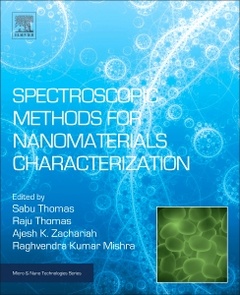Description
Spectroscopic Methods for Nanomaterials Characterization
Micro and Nano Technologies Series
Coordinators: Thomas Sabu, Thomas Raju, Zachariah Ajesh K, Mishra Raghvendra Kumar
Language: English
Subject for Spectroscopic Methods for Nanomaterials Characterization:
Keywords
? AFM; Analysis chamber; Architectural building materials; Atomic force microscopy; Atomic nucleus; Carbon foam; Carbon nanocomposite; Chemical composition; Chronoamperometry; Chronocoulometry; Chronopotentiometry; Coatings; Confocal Raman microscopy component; Coulometry; Dielectric loss; Dielectric spectroscopy; Electric permittivity; Electrochemical cell; Electrochemical characterization; Electrochemical impedance spectroscopy; Electromagnetic properties of materials; Electron microscopy; Electron shell; Experimental methodology; Faraday cup detector; Fourier transform infrared spectroscopy; Free-space method; Galvanostatic charge-discharge; High-vacuum tip-enhanced Raman spectroscopy; Hyperfine interactions; ICP-MS; Ion detector; M�ssbauer spectroscopy; Magnetic loss; Mass analyzer; Materials properties; Metal nanoparticles; Microwave; Microwaves; Millimeter wave; Morphology; Nanocomposite; Nanodielectrics; Nanomaterials; Nanooxides; Nanoparticles; NMR spectrum and chemical shift; Nuclear magnetic resonance; Nuclear spin; Permittivity; Plasma mass spectrometer; Polarizability; Polymer nanocomposites; Polymeric and nanomaterials characterization; radiation; Raman spectroscopy; Recoilless emission; Resonance Raman spectroscopy; Reverberation chamber; Scanning electrochemical microscope; Sensor studies; Setup; Shielding effectiveness; Significance and limitations; Spectra; Supercapacitors and batteries; Surface-enhanced Raman spectroscopy (SERS)Surface plasmon resonance; Tapping mode; Transmission line; UV-visible; Vector network analyzer; Voltammetric techniques
Support: Print on demand
Description
/li>Contents
/li>Biography
/li>Comment
/li>
Nanomaterials Characterization Techniques, Volume Two, part of an ongoing series, offers a detailed analysis of the different types of spectroscopic methods currently being used in nanocharacterization. These include, for example, the Raman spectroscopic method for the characterization of carbon nanotubes (CNTs).
This book outlines the different kinds of spectroscopic tools being used for the characterization of nanomaterials and discusses under what conditions each should be used. The book is intended to cover all the major spectroscopic techniques for nanocharacterization, making it an important resource for both the academic community at the research level and the industrial community involved in nanomanufacturing.
1. Atomic Force Microscopy as a Nanoanalytical Tool 2. Electrochemical Characterization 3. UV Spectroscopy: A facile approach for the characterization of nanomaterials 4. Fourier Transform Infrared (FTIR) Spectroscopy 5. Raman Spectroscopy 6. Tip Enhanced Raman Spectroscopy (TERS) 7. Confocal Raman Spectroscopy 8. Inductively Coupled Plasma Mass Spectrometry 9. Electromagnetic Characterisation of Materials by Vector Network Analyzer Experimental Set-up 10. Dielectric Spectroscopy 11. Dielectric and Magnetic Loss Behaviour of Nano-oxides 12. Mossbauer Spectroscopy 13. Nuclear Magnetic Resonance (NMR) Spectroscopy
Professor Sabu Thomas is the Director of Centre for Nanoscience and Nanotechnology, Mahatma Gandhi University, Kottayam, Kerala, India. He is also currently the Chairman of the Trivandrum Engineering Science and Technology Research Park (TrESPARK), Trivandrum, Kerala, India. He was the former Vice Chancellor of Mahatma Gandhi University, Kottayam, Kerala, India. Prof. Thomas is a highly committed teacher and a remarkably active researcher well-known nationally and internationally for his outstanding contributions in polymer science and nanotechnology. He has published over 1400 research articles in international refereed journals. and has also edited and written 210 books. His H-index is 140 and total citations are more than 94,000. He has supervised 125 PhD theses. He has received many international and national awards and recognitions. Under the leadership of Prof. Thomas, Mahatma Gandhi University has been transformed into a top University in India.
Prof (Dr). Raju Thomas is currently Vice Chancellor of Middle East University FZE, P.O. BOX 37173, Al Hamara, Ras Al Khaimah, and United Arab Emirates. Dr. Thomas started Professorship from Research and Postgraduate Department of Chemistry, Mar Thoma College, Tiruvalla-3, Kerala, India. Dr. Thomas procured Ph.D degree under the supervision of Prof. (Dr). Sabu Thomas, Director of International and Interuniversity Centre for Nanoscience and Nanotechnology, Mahatma Gandhi University, Kottayam, Kerala, India. He has extensive research experience in Nanoscience and Nanotechnology. He has twelve years of research experience in the Organic Chemistry and Polymer Chemistry laboratories of the School of Chemical Sciences, Mahatma Gandhi University, Kottayam, Kerala, India. He has also worked in the laboratory of Applied Rheology and Polymer processing of Katholieke University, Leuven, Belgium and in the laboratory at Leibniz Institute of Polymer Research Dresden, Germany. He has widely studied the kinetics of
- Explores how spectroscopy and X-ray-based nanocharacterization techniques are applied in modern industry
- Analyzes all the major spectroscopy and X-ray-based nanocharacterization techniques, allowing the reader to choose the best for their situation
- Presents a method-orientated approach that explains how to successfully use each technique
These books may interest you

Nanocharacterization Techniques 143.27 €



